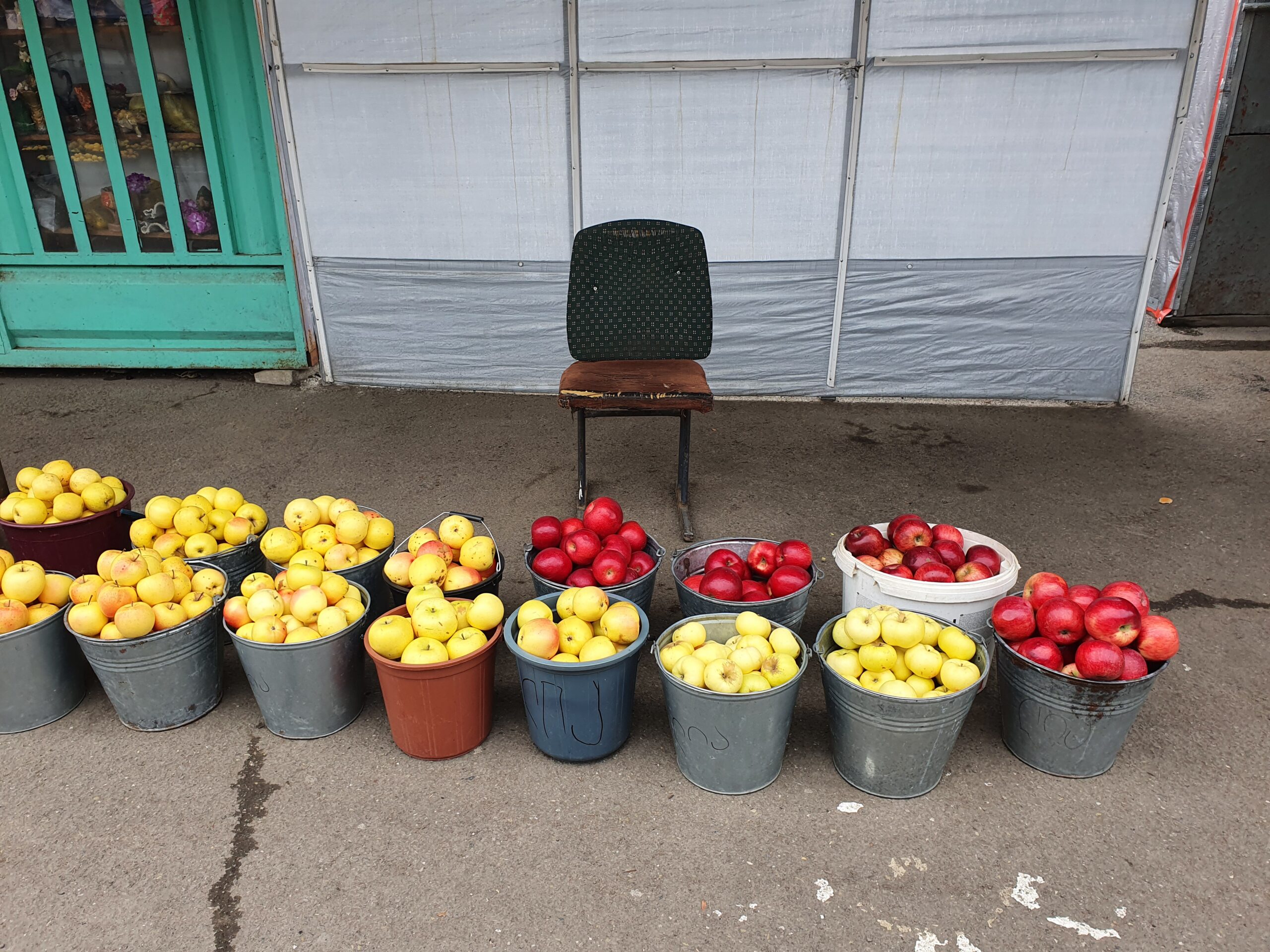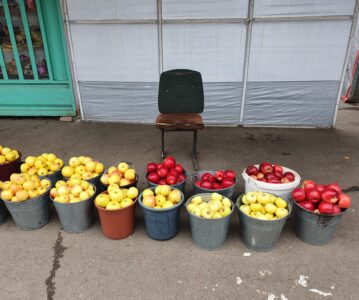We have chosen our route through Georgia in such a way that we avoid too high altitudes as much as possible and at the same time drive on the side roads with little traffic. Away from the main traffic arteries we share the roads only with a few cars. They prefer to drive around without a bumper and sometimes even without a front cover at all, giving us an unusual insight into how a car works.
However, we allow ourselves a small detour into the heights and so we drive to the small mining town of Tschiatura. In Tschiatura, manganese ore was intensively mined for more than 150 years. In order to access the various mine shafts and the city quarters, numerous gondola lifts serve the heights around the city. The name Tschiatura says it all: translated it means “a worm or none” and refers to the winding access roads to the city. As a cyclist, you quickly learn: the more winding, the steeper. The snow is melting, the worm roads are wet, and so we squeak our way down the steep road into the city center with our brake pads down.
We pass Soviet, tattered apartment blocks and also the city center in the valley foot does not give a much friendlier picture. In a small pub with bubbling pots they just look at us incomprehensibly when we try to order something. The sun shines as best it can, but the humidity makes the cold creep quickly under our clothes. The cable cars invite us to a fun ride, but somehow this small town fails to captivate us. The workers who have gathered next to the vegetable stall seem spent and warm themselves smoking at small open fires. The smell of coal and diesel floats between the prefabricated buildings and we decide to fight our way up the incredibly steep Wurmstrasse on the west side of town for our next overnight stay.
As soon as we have mastered the good 300 meters of altitude, we realize that this way we can actually leave the cold, heavy air masses behind us a bit. We spy our perfect spot independently, as we often do: a stately church perched on a ledge a bit away from the village, promising a wonderful view and a quiet night.
The next day we drive up and down until the road finally turns to the north and we whiz through a pretty, stiff-frozen valley towards Khashuri in sub-zero temperatures. The valley seems to be a popular destination for summer excursions; for the first time we discover small roadside inns that invite us to linger. After a refreshment with – surprise: kachapuri! – and probably out of pity handed liquor, we gradually lose altitude and the forest gives way to an open, steppe-like landscape. We have just changed a climate zone!
This becomes especially visible the next day when we enter Gori. From the castle that towers over the city, we look out into a sandy, rolling countryside that towers in the distance as high, snow-capped mountains. From the castle we spy a weekly market and soon we are strolling through the peasant displays. Warmly wrapped women offer what their garden or farm has to offer: Apples are offered in tubs, cabbage and herbs, walnuts in various price ranges, dried plums, pears and persimmons, and the salty, crumbly fresh cheese that should first be soaked in hot water before eating. The market women and men are happy to see us foreigners and give us tangerines and interested looks and gestures. Looking at the displays, we realize why restaurants are such a rare sight here: The majority of the people are self-sufficient and everything from corn to bacon and cheese is produced on their own land or in the nearby area. Wild herbs are dried and used as tea, herbs are also grown by the people themselves and almost every family produces its own wine, schnapps and liquor.
We soon learn what Gori is internationally known for: a certain Josef Stalin, Soviet politician and dictator by profession, saw the light of day here. His original birthplace is prominently displayed in the center of town and it is here that we meet Mario, a northern Italian resident of Tbilisi, who immediately invites us to join him in his shared apartment as soon as we arrive in the capital.
We find a spacious room for the equivalent of 12 francs, wash all our laundry again and enjoy cooking on a real stove.
After another cold drizzling day in Gori we take the last stage to Tbilisi under our wheels. The sun is shining and the landscape becomes spectacular in a bare way. The barren meadows gave enough for the frugal sheep and so we discover here again bigger flocks of sheep with their companions moving over the hill ranges. A semi-wild herd of horses gallops across the road in front of us in the evening sun, adding a bit more magic to the lonely area. We turn off on a dirt road to an antenna and up there, on the highest point of the hill chain we set up our camp in a hollow. Empty of people, empty of trees, just us, the stars and the antenna. We discover the burning quality of sheep dung and spend a wonderful evening around the warming campfire.
The following driving day is a fighting day. The headwind whips even the last snot out of our noses and makes us pedal in very low gears even on straight stretches.
For our lunch break we buy as usual an oven-fresh Schotibrot and sit down right next to the small road in the sun. It does not take long until a family beckons us to their garden. Since we want to finish our meal first, we thankfully decline and are subsequently presented with homemade Churchhelas. With the offer “Coffee?” we finally let ourselves be convinced and let ourselves be led into the warm room.
The coffee is a blessing and so is the short meeting with the family! The cousin from Azerbaijan is very eager for us to taste the family’s wine, and he would like to pour us a large orange schnapps right away. Maka, the mother is a trained nurse. But for the 300 Lari (100 Fr.), which she would earn monthly in Tbilisi, the way is not worthwhile by far. So, like so many women in Georgia, she is mainly occupied with self-sufficiency: Planting, tending, harvesting, canning, fermenting, pickling, chopping wood, caring for animals, preparing meals, and so on. The father, Gocha, also calls himself unemployed and goes fishing instead. Pictures on his cell phone suggest that he does this quite professionally, selling the fish from the nearby river for a profit. In order to expand the house, they all lend a hand themselves. Currently, a large metal gate is being welded together in front of the house, and Gocha proudly points to the freshly finished basement. The 13 fattening pigs also live in the garden at the moment. This “business model” is a popular (side) purchase in Georgia. For calves, the income statement looks something like this:
For 7 Lari per kilogram a live calf is purchased. That means for about 700 Lari you get a calf, let it convert the grass in the area into meat for up to 12 months and then sell it to the butcher for about 2500 Lari. For another 500 Lari, you feed the animal some additional corn or concentrated feed to increase the “harvest weight”. Such an animal ready for slaughter then brings 150 to 180 kg of meat on the scales. Many families keep a few calves in addition to their milk cows for this reason. Towards evening, after their independent foraging expeditions, the numerous domestic animals stand in front of their garden gate and wait to be let in for the night.
We say goodbye to the family and after a secluded night with a wonderful campfire in the National Park Tiblisi, we let the tail wind blow us to the capital.


